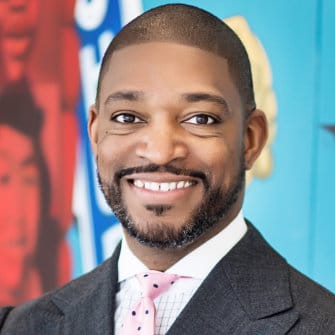
James Buckser
Staff writer
While he had always worked in nonprofits and social justice, the Rev. Starsky Wilson first focused on the thing that would drive his career while at the Deaconess Foundation.
“Our work very explicitly focused on child advocacy and investing in organizations that were advocating and building power for children,” Wilson said. “I had the opportunity to really dedicate my full time and attention to this work.”
Wilson has worked in the realms of faith and child advocacy for years, and he will bring his knowledge to Chautauqua at 2 p.m. today in the Hall of Philosophy, closing out Week Five’s theme, “Religious and Ethical Infrastructure.”
That work with the Deaconess Foundation, Wilson said, is what connected him to the Children’s Defense Fund, where he is currently president and CEO.
“Children’s Defense Fund is a 50-year-old, national, multi-issue child advocacy organization focused on advancing the vision of a nation where marginalized children flourish, leaders prioritize their well being, and communities wield the power to ensure they thrive,” Wilson said.
The Children’s Defense Fund works in three core areas, Wilson said: public policy advocacy in capitals across the country; power-building and community-organizing “focused on faith communities, students and youth, and caregivers;” and direct service programming through a network of Freedom Schools.
The Freedom Schools have been running for 50 years, Wilson said, and are “out of school time” interventions, which focus on teaching agency for young people, history consistent with the cultural backgrounds of the students, and their ability to make a difference in the world.
“We train college students across the country to run this six- to eight-week program during the summer, and after school in some locations,” Wilson said. “It’s focused heavily on culturally relevant pedagogy, history and literacy.”
Wilson is also involved in the CDF Action Council, a 501c4 social welfare organization, as compared to the Children’s Defense Fund which is a 501c3 nonprofit institution, and therefore forbidden from trying to influence legislation, unlike a 501c4.
“There we have an opportunity to do a little more focused grassroots lobbying around some of our policy agenda,” Wilson said.
In his work, Wilson said he has come to recognize that “much of our sense of social vision is informed by religion and theologies,” whether they are explicitly expressed or embedded influences, and that we come to “believe things are possible in the world, in the West,” based on religious and social infrastructure.
“The ideas that … spiritual beings and people produce, make a social vision possible, they are part of the social infrastructure,” Wilson said. “They inform the broader narrative and hopes of a community, and then the actual religious bodies, the synagogues, mosques, temples and congregations create the container by which we work to make these social visions happen in the world.”
In his talk, Wilson said he plans to discuss the connection between theology and social vision, as well as those involving policies of congregational religious structure, and how they advance those visions.
“Given my work, I’ll focus significantly on advancing a vision of a world where children are able to thrive,” Wilson said.
Wilson hopes people leave his lecture considering ways their spiritual or religious traditions can create conditions for children to live in a better world.
“I am hopeful that as we gather together, we might see the future in a new way through the lens of children, especially in this moment where caring for children is literally a life and death situation in our country,” Wilson said. “I think it will take people of faith centering these stories, and considering the ways in which our theologies inform our social visions and realities, to get to a better world.”




